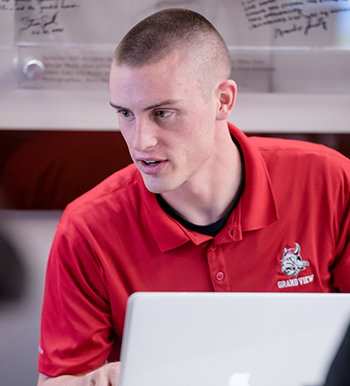
Kendall Antle
Grand View University is a liberal arts college in Des Moines, Iowa, with a student body of about 2,000. At such a small school, said its student body president Kendall Antle, it’s true: everybody seems to know everybody. But the small-town feel does come with its disadvantages.
“One major issue we face is apathy,” Antle said. “You have cliques. People have a tendency to stay with whom they know and work with whom they know.”
Although Grand View students come from 38 states, two territories and 23 countries, getting them to talk to fellow students who are different from themselves about the challenges they face isn’t easy.
“People aren’t willing to go outside their comfort zone and have these difficult conversations,” he said.
The Grand View student body’s general hesitation to reach out across cultural and social groups is what Antle hopes to change following his participation in the first-ever USC Shoah Foundation Intercollegiate Diversity Congress (IDC) Summit, which was held Oct. 13-14, 2017, at the USC Shoah Foundation office in Los Angeles.
Like most of the student leaders who attended the IDC Summit, Antle was first introduced to USC Shoah Foundation at the National College Leadership Council’s Presidential Leadership Summit for university student leaders earlier this year in Washington, D.C. USC Shoah Foundation Senior Director of Programs and Operations Kori Street gave a keynote presentation about IWitness and the power of testimony to foster diversity and inclusion in campus communities.
Street’s presentation was so affecting that after awhile, Antle put down his notebook and pen and just listened.
“I was taken away by everything that the Shoah Foundation has done and what it has become,” he said. “[I decided to come to the IDC Summit because] I need to be a more well-rounded individual on these issues, whether it’s diversity or the history of events like the Holocaust and genocide. As a student body president I can take those experiences back to my campus to help shape my campus to be a better place, to make my fellow students more empathetic individuals who embrace diversity.”
At the IDC Summit, the 20 participants – student leaders from universities across the country – learned about the Visual History Archive, IWitness, and strategies for using testimony to promote tolerance and inclusion on their campuses. They also learned how to construct their own activities in IWitness and had dinner with Yannick Tona, a child survivor of the Rwandan Tutsi Genocide who is now a motivational speaker in the United States.
Antle said he enjoyed the group discussions in which the participants talked about the challenges they face on their own campuses, what’s worked for them and their goals for fostering more diverse, inclusive communities.
He had the opportunity to apply everything he had just learned at the summit the morning after he returned home when Grand View kicked off its annual Global Vision Week, which this year focused on immigration. The university offered opportunities for students to learn more about the personal stories of immigrants and develop their cultural understanding and global awareness.
“I took back [from the IDC] the ability to convey the importance of empathy” at Global Vision Week, Antle said. “With the topic of immigration, we have to understand the individual standing opposite us. It’s not about policy, it’s about people.”
Antle plans to incorporate testimony clips into the activities of the student leadership’s Diversity and Outreach Committee. He already has one clip in mind, a Cambodian Genocide survivor talking about immigrating to the United States.
“We want to start somewhere and I think that’s the best place to start it,” Antle said. “From there we can help spread that message and start hosting and incorporating these into bigger forums to help start the conversation. These testimonies and information needs to be preserved and it needs to be taught so future generations, beyond my generation, don’t allow this type of behavior and injustice to prolong.”